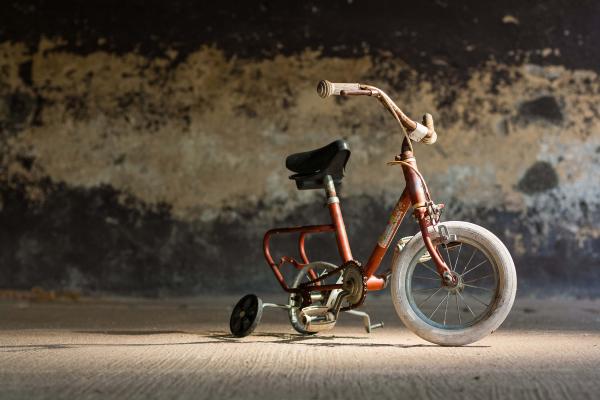My parents, like many of the elders in our communities, share life lessons through the telling of stories. I have learned so much from sitting at their feet to glean nuggets of wisdom meant to help guide me along life’s way. As I reflect on this month’s Faith in Action theme of Repair, I’m reminded of the story my father told me about a tricycle he had as a little child. He has told me the story several times now, but recently, after watching a television news broadcast, he recounted the story once again, and this time the lesson he shared had different significance for the concept of "repair."
My father grew up knowing his family did not have as much as other families. Yet he did not truly realize the depth of poverty into which he was born. On his street – Gallas Street in Port of Spain, Trinidad — the children played just as other children did, imagination and ingenuity as the main sources behind crafting the toys and games that they played. The best of these toys was his tricycle. It had no fancy bells or whistles, no different speeds or multi-colors — it was basic red with three wheels and handlebars. My father shared it with his two brothers and all the other boys on the street. They rode it so much that one day, one of the wheels came off the tricycle — so they continued riding with just two wheels until they out grew it, and passed it on to the next little boy on the street.
He paused at this point and said to me, “We loved that tricycle so much and even when it was damaged, we were determined to do what was needed to repair it so that we all could have a chance to ride. It seems to me that these days, no one wants to take the time to repair anything. They just want to replace it.”
It is difficult to express the depth of hopelessness and frustration I saw in my father’s eyes. His long pause and deep sigh spoke directly to my heart and to my consciousness. Is it true? Have we come to this? Are we, our relationships, our communities, our shared values, our world — are we the broken tricycles?
If so, are we willing and/or able to spend the time, energy, and risk that is needed to see that we get us to a place of repair? Or are we so numb and discouraged or simply disinclined to do the hard work of restoration that we merely put in a request for an exchange and disengage entirely?
We live now in a world of normalized alternative facts and extreme virtual, sensational, and celebrity reality. The work of true reparations in any area, community, or relationship cannot occur unless there is first an acknowledgement of infraction and breakdown, then a decision — to either commit to the work of healing and restoration, or to abandon things entirely.
One of the most striking parts about my father’s story was not only that the responsibility of repair for the tricycle was left with whoever was riding it at the time, but also that the tricycle had to be fixed so that the next person would also be able to ride — there was no alternative.
The world that God gave us is broken. All of its fragmented pieces may not have been shattered at any given time by direct result our individual hands, but the next generation must also be able to ride the “tricycle,” and they are dependent on our faithful stewardship.
Being prophetic is not just about naming structural evils. It is also about offering solutions to move toward the reality that we want, and then being willing to work to make it happen, even if we do not live to see its manifestation. We know many of the areas in need within our communities and we know some of what it will take for its repair: more galvanized support structures for families, elders, dis/differently abled, persons re-entering society; more financial, psycho-social, educational resources; protection of rights for all, particularly women, children, youth, the LGBTQ community, the environment, all those who are considered the last, the least, and the left out. We know that remaining complacent is not an option.
Resistance is holy work. It is an act of healing. But many clergy and faith leaders (myself included) are either traumatized themselves or so justice-fatigued that it becomes too difficult to sustain resistance. How can we cast vision when many of us are either in denial about or aestheticized to our brokenness, or too limited by shrinking attention spans and stunted sight? How can we even get to repair when there is still so much mistrust, misrepresentation, opacity, and human wreckage in our midst?
I do have an offering we may consider. During this Lenten season, I focused on Psalm 118:17: "I shall not die but live ... and declare the works of the Lord." And I chose to engage in #40DaysOfResistance. I began a daily practice of meditation and declaration to resist anything that was not life-giving. So perhaps the work of repair begins with us hearing God in the valley, and in the midst of death and death-dealing things, choosing to live and not die, declaring the works of a God who sees us. We must remember to do the work of self-care and communal care together. And even as empire seeks to steal, kill, and destroy us and the world around us, we must preach, teach, and carry the gospel message.
So, I say to all of us who have been called to proclaim a word in season:
Preach to save souls and bodies.
Preach to transform minds and communities.
Preach a word to comfort and convict.
Preach a word of love and liberation.
Preach a word to help open closed hearts and help open closed wallets.
Preach a word about the joy that is available to all and the justice that some do not receive.
Preach about the hell that may be in a life that is to come and the hell that some are living right now.
Preach about the hopes and the hurts.
Preach about the Christ and the Christian (they are not the same thing).
Preach about the sins of the flesh and the sins of the society.
Preach about the powerful indwelling of the Holy Spirit and the insidious evil of hegemony in this country and around the world.
Preach the gospel – the good news about who God is and God’s love for the world.
Preach so that everyone can have an opportunity to ride the “tricycles” that we have been given in life. It is everyone’s responsibility to do this hard work of repair so each generation can have a chance to ride in freedom, peace, safety, and love.
Got something to say about what you're reading? We value your feedback!







